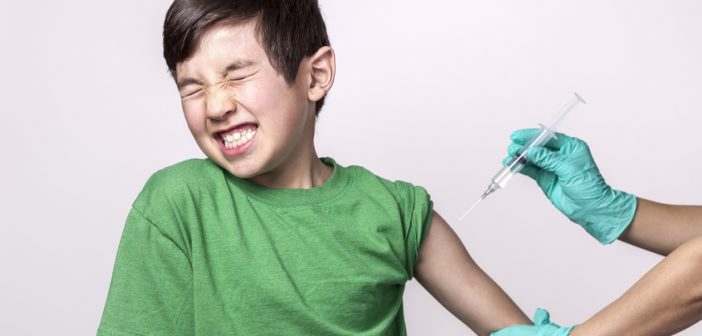While we know that having our kids vaccinated is the best way to guard against serious, potentially life-threatening diseases, watching them have to go through the pain of getting the needle is never fun.
It turns out how we act with our kids during this time is important though. A new study has found parents can shape how much pain their pre-schoolers feel from their immunisations. The research from York University found that the amount of distress and pain felt by children during their immunisations is strongly related to how their parents help them cope before and during an appointment.
The study followed 548 children throughout their immunisation schedules, and tried to find out what would best predict the children who expressed the highest levels of pain, and the lowest levels of coping. That included facial activity such as grimacing, moving their legs, crying, and their level of consolability. They also looked at discussions the parents had with their children about coping with the pain.
The results showed that children who had better coping abilities felt less pain, and that they needed their parents’ support to help them cope well.

“When children were distressed prior to the needle, that made them feel more pain after the needle,” said Pillai Riddell of York University.
Parents who encouraged their children to take deep breaths, or to use distractions such as an iPhone, helped their children to cope and therefore feel less pain.
What was more important, said Pillai, was that parents avoided showing their children negative behaviours that could cause more stress.
“Telling kids that ‘it’s ok, it’s going to be fine’ over and over again actually makes children feel anxious,” said Pillai. “Parents only say things are ‘okay’ when things are not ok. Ensuring you don’t criticise a child, such as saying: ‘strong girls don’t cry’, ‘big boys don’t do that’ is important. Also, don’t apologise to a child by saying things like: ‘I’m sorry this is happening to you’.”
All of these statements can cause distress and increase pain in children.
The study, published in Pain, found that parents’ behaviour doesn’t only affect children’s coping and pain management at the time, it can also have a long-term impact on how they will respond to needles into adulthood.
“People who have negative reactions with doctors when they are young, may avoid preventative care in the future,” said Pillai. “If you didn’t like a needle when you were five, that can stick with you.”
So no pressure then.
But keeping a calm head, a reassuring demeanour and sharing some soothing and confident words are what our kids need when we take them in for their immunisations. It’s not just helpful to them, it also makes our lives a lot easier on the day as we support them. And now we know that positive role-modelling can help them keep a lifelong healthy relationship with their own healthcare – it’s a long-term win for everyone.

